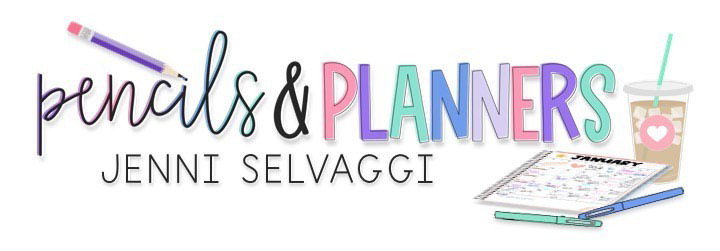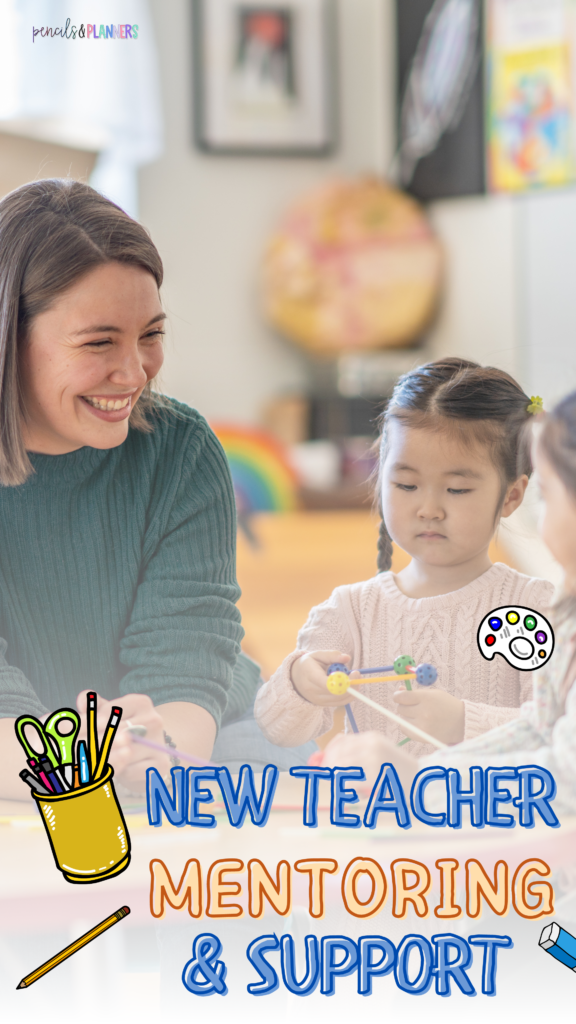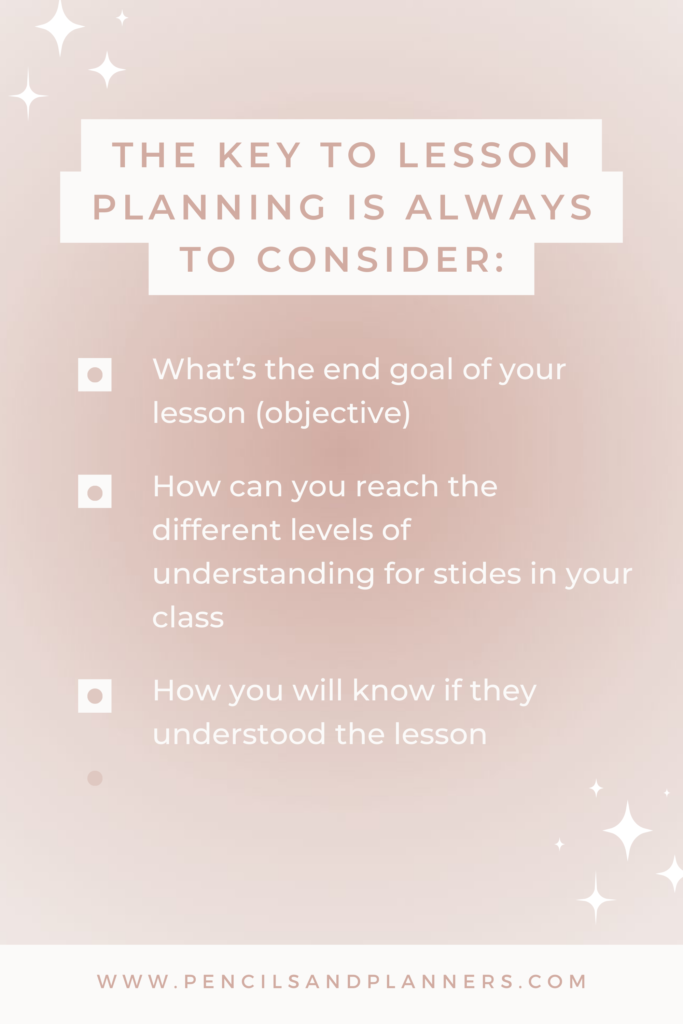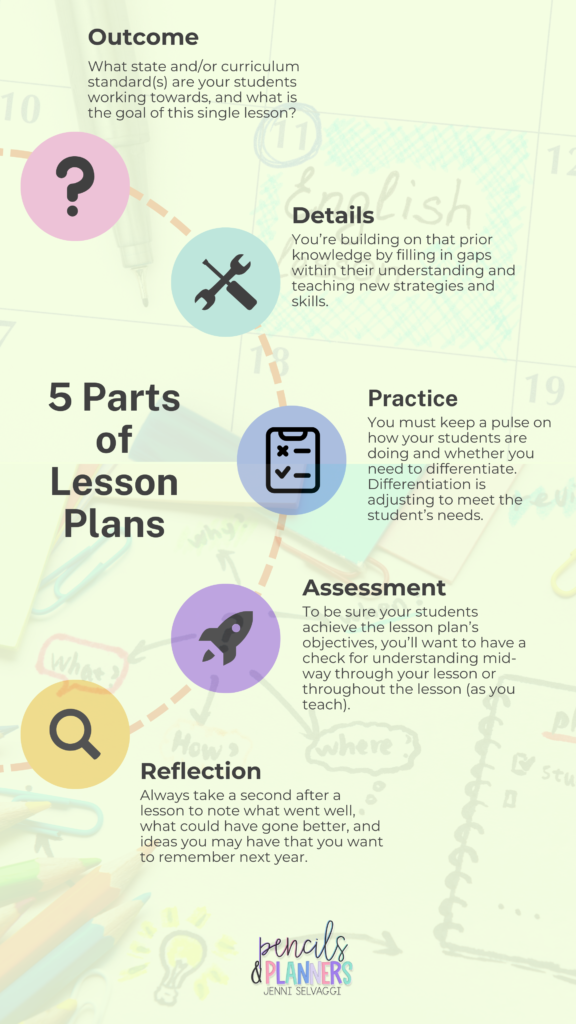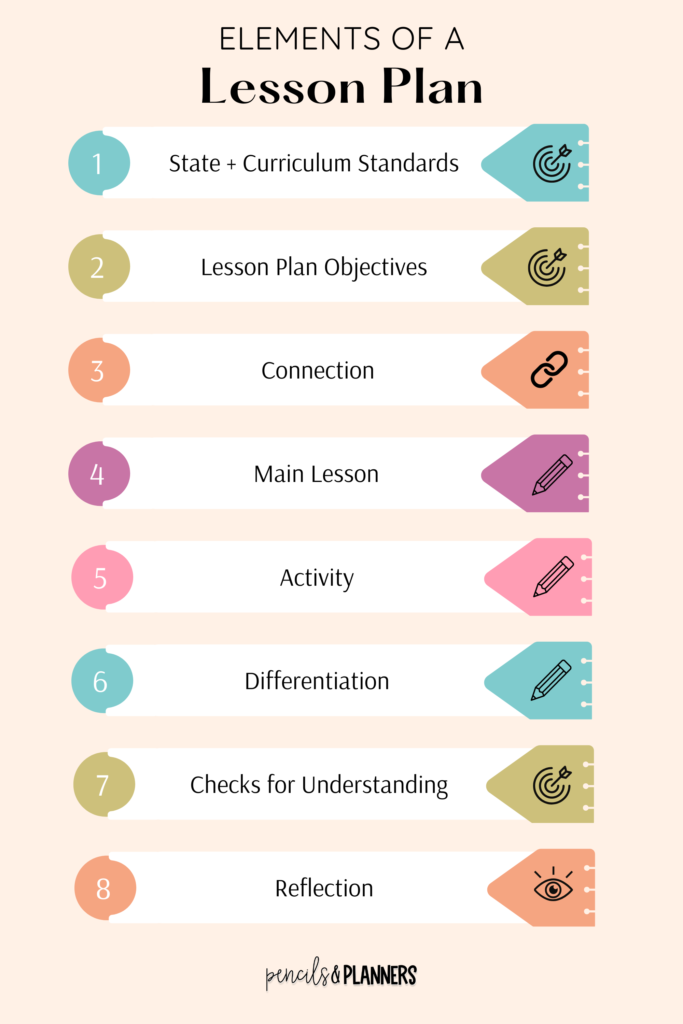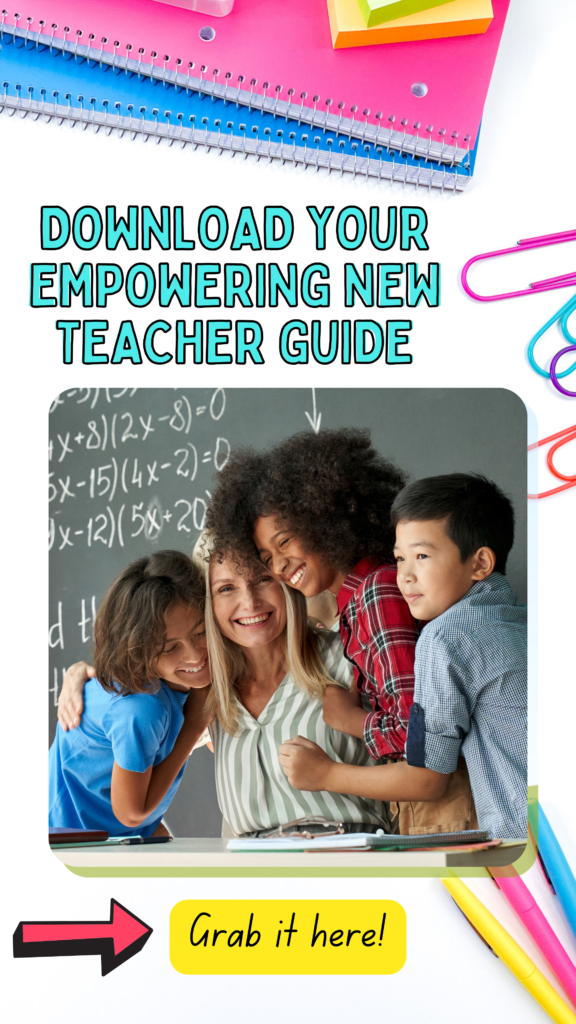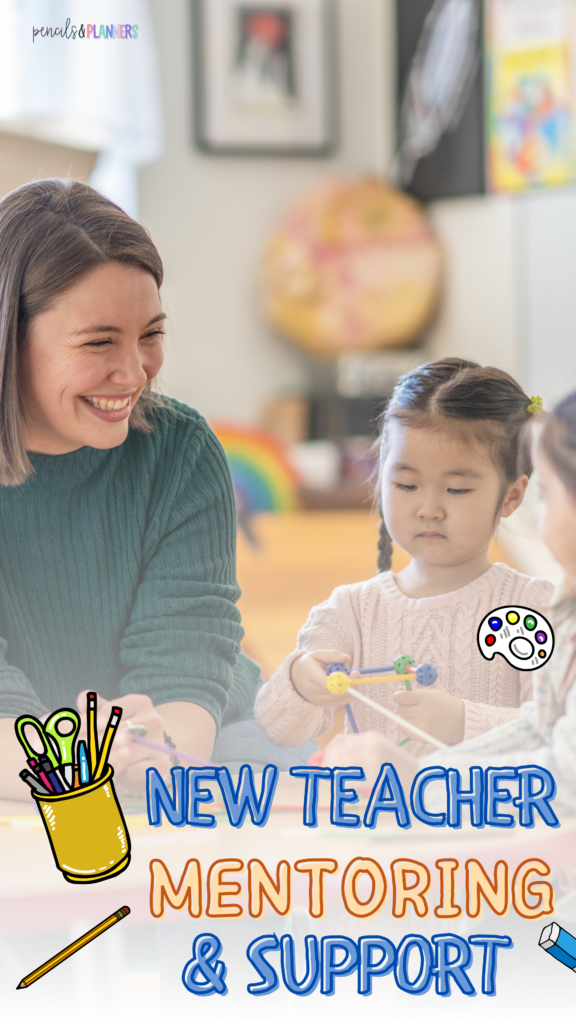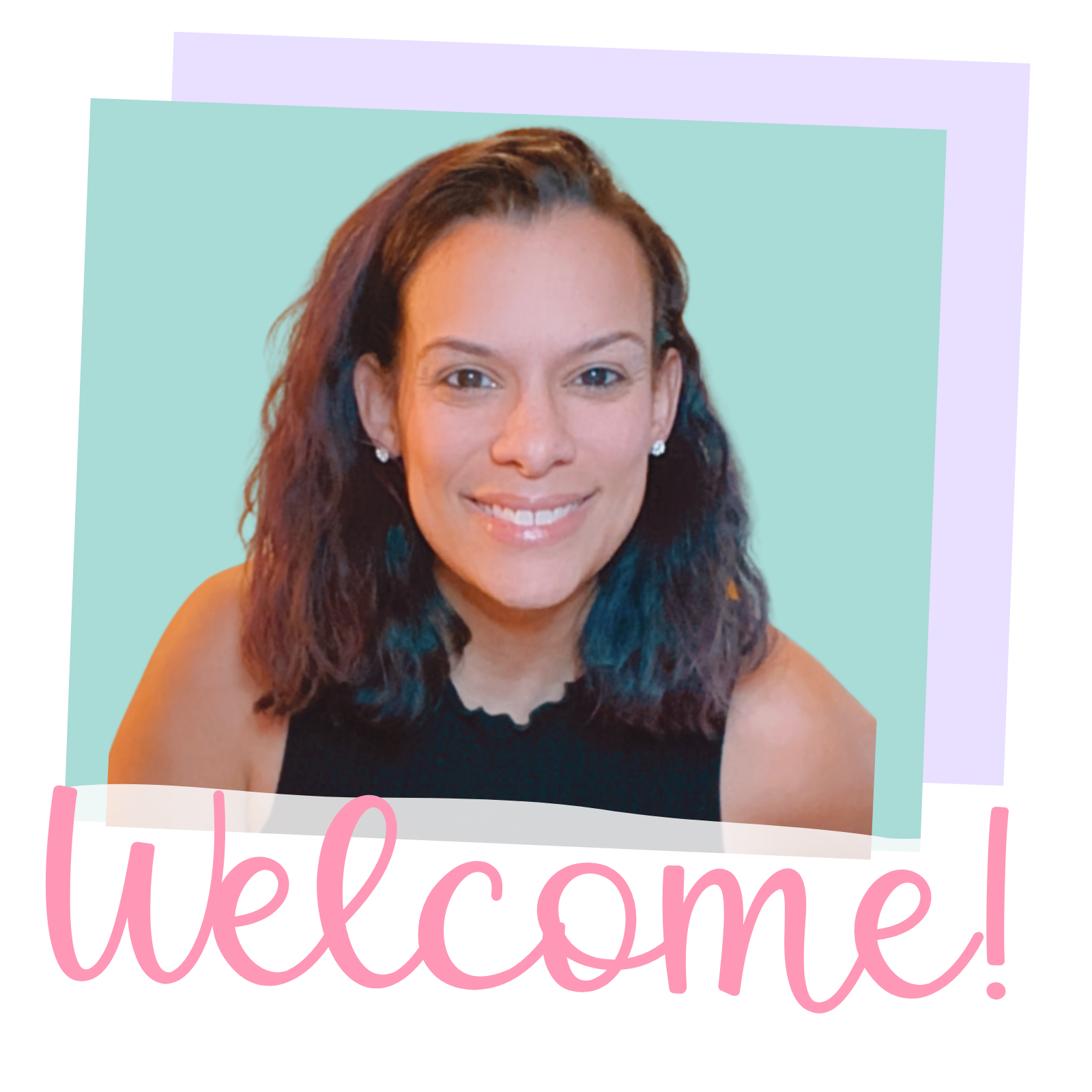Remember writing long, insanely descriptive lesson plans for every college course?! Felt like torture sometimes, amiright?! It’s your class now, and I know what you’re thinking – “I don’t need to write ALL OF THAT DOWN!” You can function with post-its, think on your feet, and be fine!
I will give you the real deal on lesson plans and why you SHOULD write them (at least at the beginning of your career). Lesson plans are one of the most fundamental tasks you’ll have. They will seem time-consuming, even daunting, at first, but it’s a first-year teacher must (and even second and third-year). In this blog post, I’ll share why lesson planning is crucial, especially for new teachers like yourself. We’ll also discuss what your lesson plans should include (at a minimum) and how these components improve your skills as a teacher.
If you’re new here… Hi, I’m Jenni, a future and new teacher mentor and coach. I give future and new teachers like you, tips and strategies to navigate your first 3 years of teaching!
College lesson plans were torture, but shortly after becoming a first-year teacher, I realized that my lesson plans didn’t need 47 parts or 10 pages long. My lesson plans did, however, need specific fundamentals. My lesson plans became a little more manageable and really helped me become a better teacher!
So let’s talk about the importance of lesson plans and the basic (must-have) components.
Lesson Plan Importance and Basic Steps
Lesson planning is not just a chore—it’s your compass guiding you through the intricacies of effective teaching. It helps you determine where you’re going, why you’re going there, and HOW you’ll get there!
You’ll learn what students need as a foundation for their learning and how to build upon that knowledge.
The key to lesson planning is always to consider:
- what’s the end goal of your lesson (objective)
- how you can reach the different levels of understanding for students in your class (differentiate)
- how you will know if they understood the lesson (assessment).
With this information, you can better navigate questions, address misconceptions, and assess mastery. Furthermore, it ensures your lessons flow smoothly and cover all necessary content.
Essential Parts of a Lesson Plan
The essential parts of a lesson plan fall into 5 buckets I call ON PAR. Within each of those five categories falls the components of a solid lesson plan.
#1 Outcome
Under outcome live the standards and lesson plan objectives. What state and/or curriculum standard(s) are your students working towards, and what is the goal of this single lesson? You can’t teach everything about a topic in one period of time. Lesson planning, by its nature, will help you better understand how you can (and should) scaffold and build your lessons to best support the students.
LESSON PLAN COMPONENTS #1 and #2:
- State and/or curriculum standards
- Lesson plan objectives
#2 Details
Details are the heart of your lesson plan. The connection is a quick statement or brief story in a lesson that connects what the students already know/have just learned to the next skill or concept they will learn. You’re building on that prior knowledge by filling in gaps within their understanding and teaching new strategies and skills.
For some new teachers, a lesson outline includes the necessities and works perfectly for them: key statements or explanations, where to pause, questions to ask, when to model the task, etc. For others, scripting what to say step-by-step in the lesson is preferred.
LESSON PLAN COMPONENTS #3 and #4:
- Connection
- Main lesson
#3 Practice
Once you’ve taught the lesson, students will need an opportunity to practice independently. You must keep a pulse on how your students are doing and whether you need to differentiate. Differentiation is adjusting to meet the student’s needs. You might differentiate the content (skill or concept), the process (the strategy or steps), and the product (end result) – that really depends on the student.
When you take the time to lesson plan, you can also thoughtfully incorporate interactive and hands-on activities, multimedia resources, and real-world connections that capture students’ interest and curiosity.
LESSON PLAN COMPONENTS #5 and #6:
- Activity
- Differentiation
#4 Assessment
To be sure your students achieve the lesson plan’s objectives, you’ll want to have a check for understanding mid-way through your lesson or throughout the lesson (as you teach). These are formative assessments. You’ll also want a quick way to see their practice and determine mastery at the end of the lesson (summative assessments). If most of your students do well, you can continue to the next lesson. If most of your students were confused or had difficulty completing the activity, you’d want to reflect on the lesson and revisit it the following day. These assessments also allow you to provide timely feedback and support earlier in the learning.
LESSON PLAN COMPONENT #7:
- Checks for Understanding
#5 Reflection
Students change from year to year, and so should your lessons. But not entirely change! Always take a second after a lesson to note what went well, what could have gone better, and ideas you may have that you want to remember next year. Next year when you’re lesson planning, look at your reflection notes to help you make this time better! Feel free to experiment with new strategies and learn from your successes and challenges! Over time, this reflective process will enhance your teaching skills, foster innovation, and promote continuous improvement.
LESSON PLAN COMPONENT #7:
- Reflection
Other Reads You Might Be Interested In:
- 6 Tips for Making Reflection a Consistent Habit
- What is Differentiated Instruction?
- 3 Steps to Writing Better Lesson Plans
For a new teacher monthly guide – click here!
If you’re looking for a little more support when lesson planning or any other education/classroom-related support… I’m here for you! Book a free 30-minute coaching call, here.
As you grow on your teaching journey, remember that lesson planning is a dynamic and iterative process that evolves with your experience, student feedback, and the ever-changing educational space. Embrace the creativity and flexibility that lesson planning affords, and don’t hesitate to seek support and resources from experienced colleagues, mentor teachers, and professional development opportunities.
In conclusion, lesson planning is not merely a task to check off your to-do list—it’s the cornerstone of effective teaching practice. By investing time and effort into thoughtful planning, you lay the groundwork for engaging, meaningful, and impactful learning experiences for your students. So, embrace the challenge, trust in your abilities, and let your passion for teaching shine through in every lesson you plan.
Thanks for stopping by! Before you go, share in the comments below if you agree or disagree with full lesson planning being crucial in your first few years. 👇🏼📣
